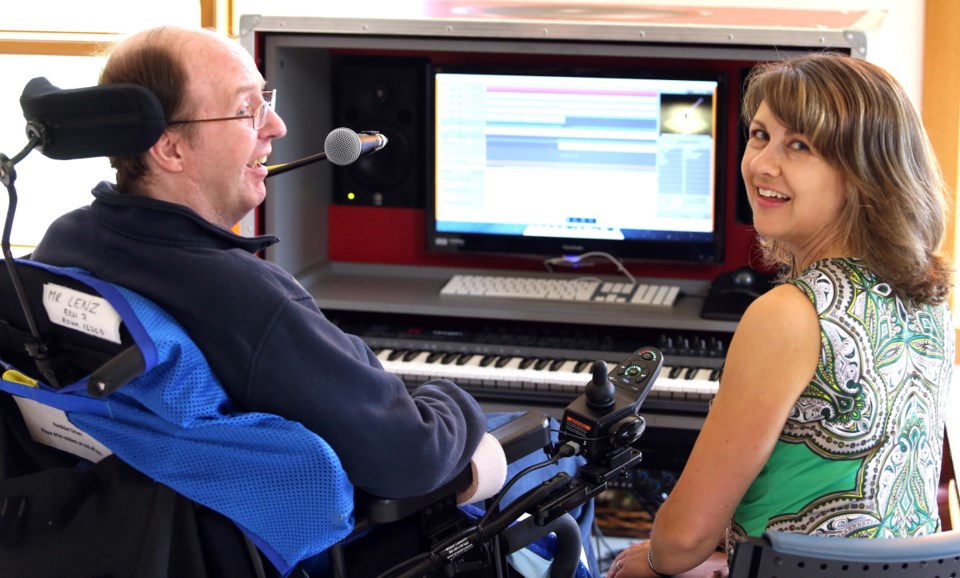“Now he trusts the beauty of the great unknown. Now he believes in love.”
— Lyrics from Sarah Elizabeth by Chris Lenz, with music therapist Kirsten Davis
The song is called, simply, Sarah Elizabeth. Musician Chris Lenz wrote and recorded it for his wife. The song is a gift that might just mean as much to him as to her.
Lenz, 48, has advanced multiple sclerosis, a progressive disease of the nervous system that has kept him in hospital for the past two years.
The father of a seven-year-old, Lenz was forced to give up his career as a musician at the age of 25 when his symptoms made the delicate work of handling guitar strings too difficult.
Thanks to the Bandwagon — a fully equipped travelling recording studio — and a group of motorcycle-riding members of the music industry who designed and fund the roving music therapy tool, Lenz is able to make music again at Saanich Peninsula Hospital.
Even though plenty of scientific research shows that music has an almost magical capacity to ease pain, anxiety and depression, and to evoke profound responses among patients with conditions like Alzheimer’s and autism, funding for music therapy from health providers and extended health services is scant.
Shaw Saltzberg, senior vice-president at the Feldman Agency, wanted to find a way to change that, and to bring music to those who need it most. So 13 years ago, he and some friends came up with the idea of an annual motorcycle rally to raise funds. The ride quickly gained the support of the Vancouver Police Department motorcycle drill team, providing a presidential escort for the noisy bunch, which includes musicians such as Dan Mangan, Raine Maida, Chantal Kreviazuk, Colin James and Jann Arden and comedian Brent Butt.
But it was a young cancer patient and budding musician who inspired the group to create the Bandwagon, a mobile recording studio. Megan McNeil, who died in 2011, had written a song called The Will to Survive during music therapy sessions at B.C. Children’s Hospital. She was able to record the song in studio with producer Garth Richardson.
Saltzberg and other Music Therapy Ride committee members Patrick Zulinov and Chris (Dunner) Duncombe, brainstormed with music therapist Carol Wiedemann to come up with the concept of a music studio on wheels.
“Some music therapists were skeptical at first,” Saltzberg said. “It looked a little too much like just glitz and glamour.”
The rolling studio is shiny red with chrome finishings, designed to look like a professional roadie’s case. With its iMac computer, guitars, slide-out keyboard and drum pad, the Bandwagon is giving music therapy a rock ’n’ roll makeover.
“Once they start to use the machine, they get very excited. It’s a big toy, it looks cool, it’s electronic.”
It’s also just the thing to change the image some people might have of music therapists as being “the lady with the ukulele,” Saltzberg said.
The cool factor helps.
“This brings the connection of rock ’n’ roll. If your goal is to work with a withdrawn teenager who doesn’t want to get out of her room and the goal is to get her out of her room, and connecting with other kids, it’s a draw. Or we can bring it right to them. It’s gotten me into rooms with kids that have said no to me before, that have been shut down. Music speaks when words fail,” Wiedemann said.
The first Bandwagon was installed at B.C. Children’s Hospital in 2012, and in 2013 the Music Therapy Ride launched Bandwagon 2, which has travelled all over the Lower Mainland, to work with dementia patients, elders in long-term care, troubled teens and hospital patients.
“This is giving music therapists another tool to use. Technology is such a huge part of life these days, it’s a huge part of music. Technology has become another musical instrument I have to be familiar with. Not just playing guitar, or piano but learning to use the Mac and Garage Band and help do recordings.”
Interest — and demand — are growing.
“We’re planning to build two more so we can reach the whole province,” Saltzberg said.
The touring Bandwagon is available to music therapists for six-week stints on a project basis, and each project comes with funding for 50 hours of staffing.
When music therapist Kirsten Davis rolled in to Saanich Peninsula Hospital with the Bandwagon and news that she and another music therapist at the hospital had received a Bandwagon grant to spend more time with Lenz, she said his face lit up.
Recording songs is not something Lenz ever thought he would do again, let alone from a hospital bed.
“He’s got so much music inside him. My role is to help him get that out. Sing to me what you would play on your instrument. He will sing a bass part, and I can program it into the computer.”
The Bandwagon won’t reverse Lenz’s illness. It won’t change the fact he has trouble breathing and experiences pain, or the fact he can no longer live at home with his wife and child, but it has changed this: Lenz has reconnected not just with music, but with an essential part of who he is and always has been — a person who, as his song says, “believes in love.”
He’s bringing his wife a love song, and because of that he says: “I feel awesome.”
